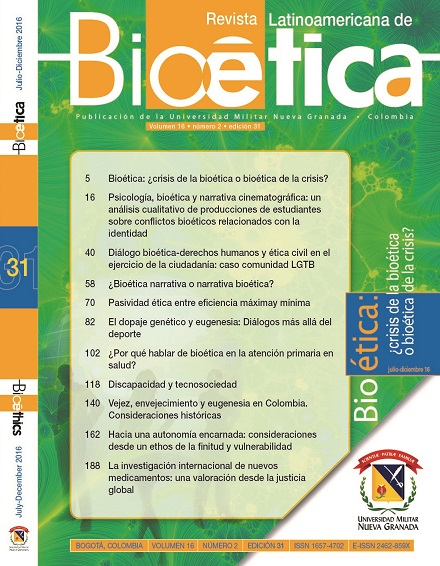¿Bioética narrativa o narrativa bioética?
Resumen
Desde los inicios de la bioética, se presenta y agudiza el conflicto entre biomedicina científica basada en evidencia, y la bioética preocupada de valores personales y participativos que la medicina terapéutica y la investigación biomédica han de respetar en la participación autónoma de pacientes y probandos. El proceso de consentimiento informado debiera desplegar la narrativa de los valores existenciales de cada persona y el contexto social en que vive. La bioética narrativa y las humanidades médicas son convocadas para sensibilizar a los profesionales de la salud en esas tareas. Su influencia por elevar los elementos narrativos en la comunicación biomédica ha sido insuficiente y decreciente, no logrado evitar un academicismo extremo y una irrelevancia social de la disciplina bioética que está en riesgo de ser marginada, desoída y precipitada en una crisis de validación.
Sugiere este artículo atender a fuentes no académicas que se muestran plenamente competentes y atractivas para encarar los problemas que la bioética no ha sabido resolver, destacando la publicación de novelas ficcionales que abordan relatos de temas bioéticos en forma amena y sistemática, que impactan más allá de las deliberaciones anémicas de la bioética: The Children Act, (I. McKewan, 2014) y Reparar a los vivos (M. de Kerangal, M., 2015), son presentadas como propuesta para inaugurar la narrativa bioética, que es el relato ficcional de temas bioéticos.
Descargas
Disciplinas:
Bioética, humanidadesLenguajes:
esReferencias bibliográficas
• Baron, J. (2006). Against Bioethics. Cambridge London, The MIT Press.
• Brody, H. (2009). The Future of Bioethics. Oxford New York, Oxford University Press.
• Brooks, P. (ed.) (2014). The Humanities and Public Life. New York, Fordham University Press http://dx.doi.org/10.5422/fordham/9780823257041.001.0001
• Charon, R. (2006). Narrative Medicine. Oxford New York, Oxford University Press.
• Downie, R.S. (2003). Medical humanities: a vision and some cautionary notes. Medical humanities 29: 37-38. http://dx.doi.org/10.1136/mh.29.1.37
• Dubiel, H. (2011). What is "Narrative Bioethics" : . doi10.3389/fnint.2011.00010. Accesado 10 de Julio, 2015 http://dx.doi.org/10.3389/fnint.2011.00010
• Faden, R.R., Beauchamp, T.L. (1986) A History and Theory of Informed Consent. New York Oxford, Oxford University Press.
• Fletcher, J. 1979). Morals and Medicine. Princeton, Princeton University Press.
• Fox, R.C. (1999). Is Medical Education Asking Too Much of Bioethics? Daedalus, 128(4): 1-25.
• Greenhalgh, T., Hurwitz, B. (1999). Why study narrative? British Medical Journal, 318 (2 de Enero): 48-50.
• Hedgecoe, A. (2004) Critical bioethcs: beyond the social science critique of applied ethics. Bioethics, 18(2): 120-143 http://dx.doi.org/10.1111/j.1467-8519.2004.00385.x
• Hotttois, G. (1991). El paradigma bioético. Barcelona, Anthropos.
• Hurwitz, B. (2015). Medical humanities and medical alterity in fiction and in life. J Med Ethics, 41: 64-67. http://dx.doi.org/10.1136/medethics-2014-102300
• Jones, A. H. (1999). Narrative en medical ethics. British Medical Journal, 318 (23 de Enero): 253-256.
• Lolas, F.S. (1991). La medicina como narrativa. Discurso incorporación Academia Chilena de la Lengua, 6 Diciembre.
• Maldonado, C.E. (2012). Crisis of bioethics and bioethics in the midst of crises. Revista latinoamericana de bioética, 12(1): 112-123.
• Nussbaum, M.C. (1997). Cultivating Humanity. Cambridge London, Harvard University Press.
• Pattison, S. (2003). Medical humanities: a vision and some cautionary notes. Medical humanities 29: 33-35. http://dx.doi.org/10.1136/mh.29.1.33
• Puustinen, R. (1999). Bakhtin's philosophy and medical practice – Toward a semiotic theory of doctor – patient interaction. Medicine, Health Care and Philosophy 2 (3): 275-281. http://dx.doi.org/10.1023/A:1009970712856
• Ricoeur, P. (2001). Le Juste 2. Paris, Éditions Esprit.
• Rorty, R. 1999). Philosophy and Social Hope. London, Penguin Books.
• Rothman, D.J. (1991). Strangers at the bedside. New York, Basic Books.
• Savulescu, J. (2015). Bioethics: why philosophy is essential for progress. J Med Ethics 41: 28-33. http://dx.doi.org/10.1136/medethics-2014-102284
• Sennet, R. (2011). Humanism. The Hedgehog Review, Summer: 21-30.
• Small, H. (2013). The Value of the Humanities. Oxford New York, Oxford University Press. http://dx.doi.org/10.1093/acprof:oso/9780199683864.001.0001












